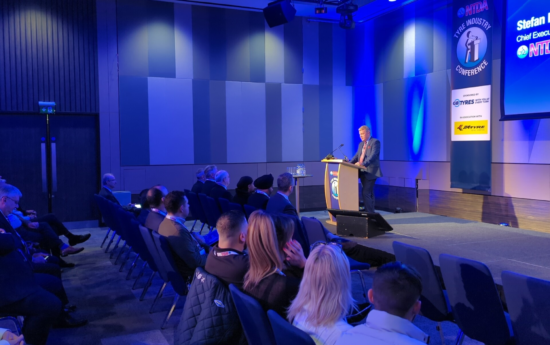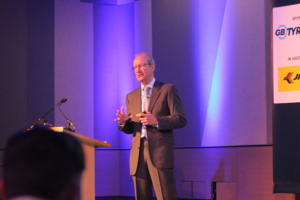‘Stronger together’ – tyre and aftermarket sector gathers for 2022 Tyre Industry Conference
 Stefan Hay, NTDA chief executive, opens the 2022 Tyre Industry Conference
Stefan Hay, NTDA chief executive, opens the 2022 Tyre Industry Conference
Morning session looks at the collaborative effort required to maintain the right to repair and a free market car service sector
The Tyre Industry Conference 2022 has opened at The Vox Conference Centre, Birmingham. The National Tyre Distributors Association’s annual event, sponsored this year by wholesaler GB Tyres and Indian tyre brand JK Tyre, is presenting tyre business delegates with a stimulating programme of presentations tackling the biggest questions facing different sectors of the distribution chain; from the newest innovations in tyres for electric vehicles to the key issues affecting tyre recovery and recycling. Stefan Hay, NTDA chief executive, set the tone of the event with his opening address, calling for a collaborative effort from the industry to tackle pressing issues, such as the skills shortage and efforts to decarbonise and promote the circular economy. Meanwhile, Simon Wright used his first conference address as NTDA national chairman to pay tribute to his predecessor Martin O’Brien as “a master of the round and black,” and to celebrate the association’s success in promoting tyre technician training and accreditation, with “around 2000 commercial tyre technicians” going through its newest scheme.
Campaigning for a free aftermarket
Neil Pattemore, UK AFCAR technical director
The first presenter of the day, concluding the conference’s morning session was Neil Pattemore, UK AFCAR technical director, who said the UK automotive aftermarket stands at a “crossroads”. The UK AFCAR coalition was formed in 2021 to lobby government on several policy issues, including the Motor Vehicle Block Exemption Regulations (MV-BER), Vehicle Type Approval (including access to Repair & Maintenance Information) and Cybersecurity. The group, whose name is an acronym standing for The UK Alliance for the Freedom of Car Repair, derived from the European group of the same name, found its raison d’être post-Brexit, when it became necessary to lobby the UK government separately from the European Union on this issue.
Pattemore explained the importance of regulatory alignment in “providing competitive choices to consumers” via the UK aftermarket in the context of vehicle manufacturers developing increasingly closed systems of after-sale service for the most recent generations of connected cars. He said that the UK government is “playing catch-up” with Brussels when it comes to ensuring the ability of car servicers to access data from new cars. The OBD port has been the most important battleground in this issue. Reverse-engineering solutions from data obtained from the OBD port has been the legitimate way for the aftermarket to continue to service vehicles fully, but this is becoming increasingly difficult, with security gateways coming into conflict with open access. The fees charged for access by vehicle manufacturers are also rising. But with data connections virtualised to allow remote vehicle access, which may render the physical data port obsolete in time, a new shop window for vehicle services has opened. Over the air services for networked cars “are here,” Pattemore said. Without aftermarket access to this data, “there cannot be a competitive marketplace for this.” While Brussels has gone some distance to acknowledging this, with the EU subsequently discussing how to regulate access to data, this conversation “is yet to begin” in the UK, Pattemore added.
Cybersecurity measures, the necessity of which to ensure drivers’ safety is not necessarily in question, are another technology that requires attention. If data is increasingly firewalled on security grounds by vehicle manufacturers, their subsequent ability to control access represents an obvious concern for independent servicers. Competition versus Security is “a fundamental argument” in Brussels. By contrast, the UK is currently “letting market forces decide” the issue, Pattemore explained.
So, what is the future business model for the aftermarket within this context? The major issue for independent operators is the way vehicle manufacturers can “suck profit” out of the aftermarket by requiring fees to allow independent operators to service cars, Pattemore said. He concluded, therefore that it is necessary for the parts of the aftermarket – including tyre distributors – to collaborate on working through these issues to ensure continued access to car data and the ability to offer competition and choices in the aftermarket. Are we too late to do anything, given vehicle manufacturers’ stranglehold on access to vehicle data, one delegate asked? Pattemore said no but added that UK AFCAR and the wider aftermarket is “playing catch-up”. He concluded by emphasising the need for government policy to be informed about what the aftermarket needs.
Ending the session, Stefan Hay explained the importance of UK AFCAR’s efforts in bringing together aftermarket interests to combat a closed-system scenario, locking out the free aftermarket, desired by some vehicle manufacturers – a strategy he said he had heard directly from at least one vehicle manufacturer. Overall, the right to repair remains an existential issue for the automotive aftermarket and the UK has fallen behind other major European markets in developing a regulatory framework to allow an independent aftermarket to flourish.
Skills shortage requires industry to reach further
One other issue that the tyre and wider aftermarket sector is tackling was expressed within Stefan Hay’s conference opening remarks: the skills shortage. The industry is “suffering” from a scarcity of technicians, Hay said, though it is also reacting by exploring more ways to attract a young and increasingly diverse talent pool to the tyre industry. Sukhi Singh, managing director of conference sponsor GB Tyres, illustrated the drive to attract younger people to the industry by addressing delegates alongside his 18-year old son, who has been developing his knowledge of the tyre sector alongside his studies since he was 13.
Striking another positive note for the morning session, Hay detailed the ways in which companies are innovating throughout the tyre value chain, from R&D in manufacturers to decarbonising wholesalers to improving tyre retail outlets’ service to consumers. He also struck a patriotic note when talking about tyre recovery and recycling: he noted the importance of keeping the material resources derived from tyre recovery processes within the UK, while also supporting the “highly skilled” tyre recovery sector.
“You are all an integral part” of the stewardship of the industry, Hay said, an appeal for collective involvement that is especially important in a difficult social, economic and political context. Wright backed this approach, saying the association is increasing its partnerships, both in terms of a long list of new members and the growing partnerships with the Tyre Recovery Association and the Wheelwrights charity.





Comments